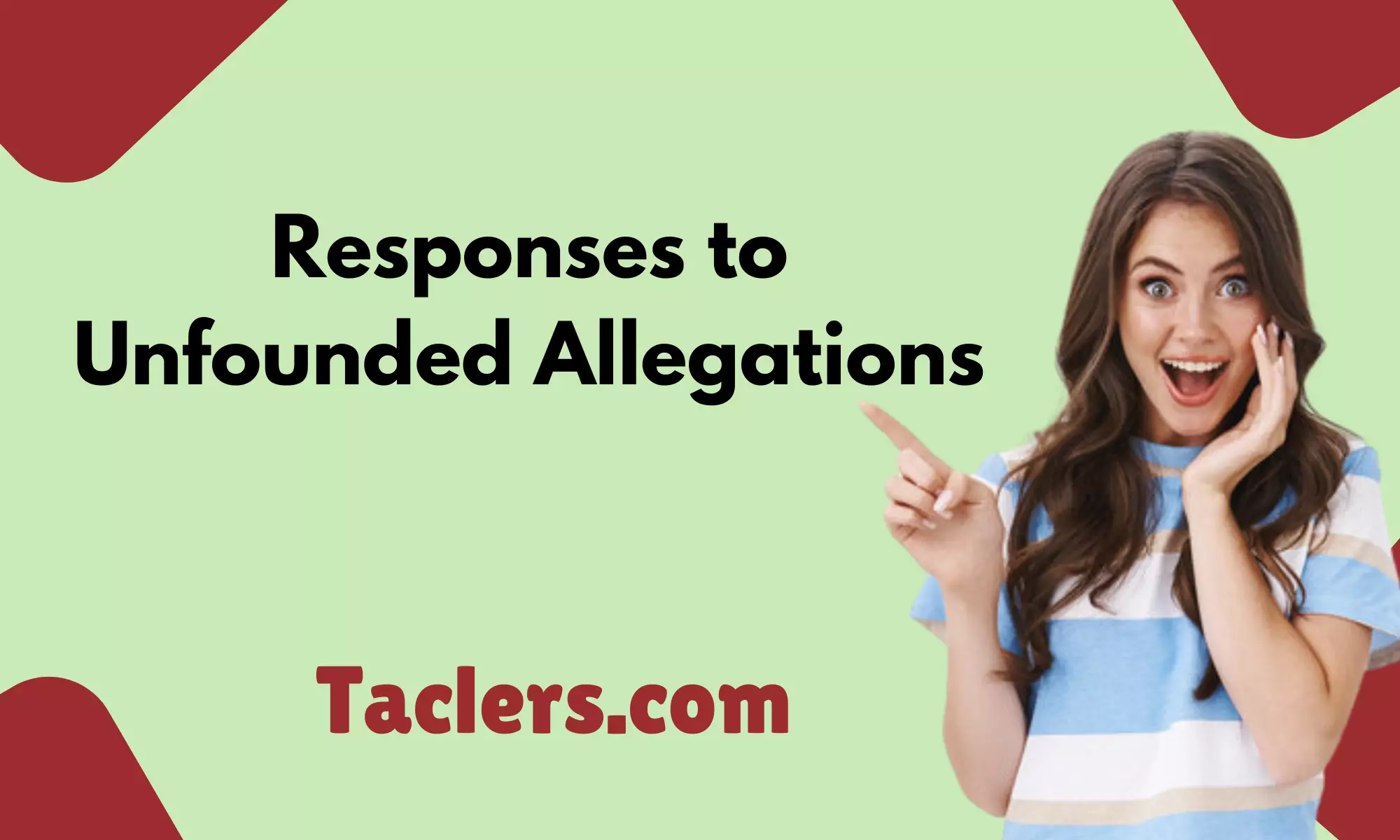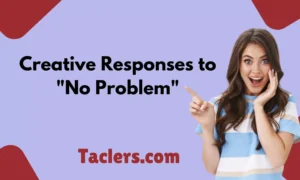Dealing with unfounded allegations can be challenging, especially in professional settings where maintaining composure and credibility is crucial. It’s important to address such allegations calmly and assertively.
Here are 30 thoughtful responses to handle accusations that lack merit, ensuring you stay professional and clear.
1. “I’m Confident in My Actions and Can Provide Evidence.”
Explanation:
This response reassures that you have documentation or proof to support your position.
Example:
Accuser: “I believe you mishandled the report.”
You: “I’m confident in my actions and can provide evidence to show that the report was handled correctly.”
By saying “Can provide evidence,” you assert your preparedness to prove your case.
2. “These Allegations Are Unfounded and Do Not Reflect My Work.”
Explanation:
A firm response that denies the allegations and distances them from your professional conduct.
Example:
Accuser: “I’ve heard you’re not meeting your targets.”
You: “These allegations are unfounded and do not reflect my work. I meet all my targets as per the performance reports.”
By saying “Do not reflect my work,” you emphasize the discrepancy between the allegations and your actual performance.
3. “Let’s Review the Facts Together to Clarify Any Misunderstanding.”
Explanation:
A constructive approach that invites discussion to resolve any confusion.
Example:
Accuser: “There are concerns about your project management.”
You: “Let’s review the facts together to clarify any misunderstanding.”
By saying “Review the facts,” you promote transparency and open dialogue.
4. “I’m Happy to Address Any Specific Concerns You Have.”
Explanation:
This response shows willingness to discuss and address particular issues.
Example:
Accuser: “I think there are issues with your expense reports.”
You: “I’m happy to address any specific concerns you have regarding my expense reports.”
By saying “Address any specific concerns,” you offer to resolve detailed queries.
5. “I Have No Knowledge of Such Allegations and Would Appreciate More Details.”
Explanation:
A polite request for more information to understand the nature of the allegations better.
Example:
Accuser: “There are rumors about your performance.”
You: “I have no knowledge of such allegations and would appreciate more details to address them properly.”
By saying “Appreciate more details,” you seek clarity to handle the situation effectively.
6. “These Claims Are Not Supported by Any Concrete Evidence.”
Explanation:
A response that challenges the credibility of the allegations by pointing out the lack of evidence.
Example:
Accuser: “I’ve heard you’re involved in unethical practices.”
You: “These claims are not supported by any concrete evidence. My work is conducted with the utmost integrity.”
By saying “Not supported by any concrete evidence,” you emphasize the lack of foundation in the claims.
7. “I Am Committed to Maintaining Transparency and Integrity in All My Work.”
Explanation:
A statement reinforcing your dedication to ethical standards.
Example:
Accuser: “There are questions about your adherence to company policies.”
You: “I am committed to maintaining transparency and integrity in all my work.”
By saying “Maintaining transparency and integrity,” you reinforce your ethical standards.
8. “I Would Like to Discuss This Matter Further to Clear Up Any Misconceptions.”
Explanation:
An invitation to have a detailed discussion to resolve misunderstandings.
Example:
Accuser: “I’ve heard you’re not following procedures.”
You: “I would like to discuss this matter further to clear up any misconceptions.”
By saying “Clear up any misconceptions,” you aim to resolve misunderstandings through dialogue.
9. “I Can Provide Documentation That Contradicts These Claims.”
Explanation:
An offer to present documentation that disproves the allegations.
Example:
Accuser: “I think you’re not meeting deadlines.”
You: “I can provide documentation that contradicts these claims, showing that all deadlines have been met.”
By saying “Provide documentation,” you offer tangible proof to counter the allegations.
10. “These Allegations Are Not Reflected in My Performance Reviews.”
Explanation:
A response that highlights the inconsistency between allegations and documented performance reviews.
Example:
Accuser: “There are rumors about your reliability.”
You: “These allegations are not reflected in my performance reviews, which consistently show strong reliability.”
By saying “Not reflected in my performance reviews,” you highlight discrepancies.
11. “I’m Open to a Constructive Discussion to Address Any Concerns.”
Explanation:
A willingness to engage in a positive conversation to address issues.
Example:
Accuser: “There are concerns about your teamwork.”
You: “I’m open to a constructive discussion to address any concerns about my teamwork.”
By saying “Constructive discussion,” you promote a solution-oriented approach.
12. “These Accusations Do Not Align with My Professional Conduct.”
Explanation:
A response asserting that the accusations do not match your known professional behavior.
Example:
Accuser: “There’s talk about your performance.”
You: “These accusations do not align with my professional conduct, which is consistently reviewed and evaluated positively.”
By saying “Do not align with my professional conduct,” you stress the contrast between accusations and actual behavior.
13. “I Would Like to Review the Evidence That Supports These Claims.”
Explanation:
A request to see any evidence backing the allegations.
Example:
Accuser: “I’ve heard you’re not complying with regulations.”
You: “I would like to review the evidence that supports these claims to address them appropriately.”
By saying “Review the evidence,” you demand accountability for the accusations.
14. “I Have Always Adhered to Company Policies and Standards.”
Explanation:
A statement reinforcing your adherence to established policies and standards.
Example:
Accuser: “There are concerns about your compliance.”
You: “I have always adhered to company policies and standards, and I am happy to demonstrate this.”
By saying “Adhered to company policies,” you emphasize your commitment to rules and standards.
15. “Please Provide Specific Examples So I Can Address Them Directly.”
Explanation:
A request for specific examples to address the allegations directly.
Example:
Accuser: “There are issues with your handling of projects.”
You: “Please provide specific examples so I can address them directly.”
By saying “Provide specific examples,” you focus on addressing concrete issues.
16. “I Am Happy to Cooperate Fully to Resolve Any Issues.”
Explanation:
A willingness to work collaboratively to resolve the situation.
Example:
Accuser: “There are doubts about your project results.”
You: “I am happy to cooperate fully to resolve any issues and clarify any doubts about my project results.”
By saying “Cooperate fully,” you show a proactive and collaborative attitude.
17. “These Allegations Do Not Reflect My Track Record.”
Explanation:
A response that points out the discrepancy between allegations and your established track record.
Example:
Accuser: “I’ve heard about problems with your performance.”
You: “These allegations do not reflect my track record, which shows consistent performance and reliability.”
By saying “Do not reflect my track record,” you highlight the inconsistency with past performance.
18. “I Have Always Been Transparent and Ethical in My Work.”
Explanation:
A statement reinforcing your commitment to ethical practices.
Example:
Accuser: “There are questions about your integrity.”
You: “I have always been transparent and ethical in my work, and I can provide examples of my adherence to these principles.”
By saying “Transparent and ethical,” you emphasize your integrity.
19. “Let’s Discuss This Further to Clarify Any Misunderstandings.”
Explanation:
An invitation for further discussion to clear up any confusion.
Example:
Accuser: “There are concerns about your recent project.”
You: “Let’s discuss this further to clarify any misunderstandings and resolve the issue.”
By saying “Clarify any misunderstandings,” you aim to resolve confusion through dialogue.
20. “I Can Demonstrate Compliance with All Relevant Standards.”
Explanation:
An offer to show how you meet all necessary standards and regulations.
Example:
Accuser: “There’s talk about non-compliance.”
You: “I can demonstrate compliance with all relevant standards and regulations.”
By saying “Demonstrate compliance,” you offer proof of adherence to standards.
21. “I’d Like to Know More About the Basis for These Allegations.”
Explanation:
A request for more information about the foundation of the accusations.
Example:
Accuser: “There are allegations about your work ethics.”
You: “I’d like to know more about the basis for these allegations so I can address them effectively.”
By saying “Basis for these allegations,” you seek clarity on the accusations.
22. “I Have Not Received Any Formal Feedback Regarding These Concerns.”
Explanation:
A response indicating that no official feedback has been given on the issues.
Example:
Accuser: “There are concerns about your recent performance.”
You: “I have not received any formal feedback regarding these concerns, so I am unsure of the specifics.”
By saying “Not received any formal feedback,” you highlight the lack of official communication.
23. “I Am Confident That a Review Will Show the Truth.”
Explanation:
A statement expressing confidence that a formal review will support your position.
Example:
Accuser: “There are accusations about your project outcomes.”
You: “I am confident that a review will show the truth and clarify any misunderstandings.”
By saying “Review will show the truth,” you express confidence in a thorough evaluation.
24. “Please Provide the Specific Evidence You Have Regarding These Allegations.”
Explanation:
A request for specific evidence to substantiate the claims.
Example:
Accuser: “There are doubts about your commitment.”
You: “Please provide the specific evidence you have regarding these allegations so I can address them.”
By saying “Specific evidence,” you seek concrete proof to handle the allegations.
25. “I Am Open to Any Investigation That Will Clear Up These Issues.”
Explanation:
A willingness to participate in an investigation to resolve the allegations.
Example:
Accuser: “There are issues with your recent conduct.”
You: “I am open to any investigation that will clear up these issues and provide clarity.”
By saying “Open to any investigation,” you demonstrate a cooperative approach.
26. “I Maintain High Standards and Would Welcome Any Verification.”
Explanation:
A response that indicates readiness for verification of your high standards.
Example:
Accuser: “There are concerns about your adherence to quality.”
You: “I maintain high standards and would welcome any verification to prove this.”
By saying “Welcome any verification,” you invite scrutiny of your performance.
27. “Let’s Set Up a Meeting to Discuss This in Detail.”
Explanation:
A proposal to have a detailed discussion about the allegations.
Example:
Accuser: “There are allegations about your efficiency.”
You: “Let’s set up a meeting to discuss this in detail and address any concerns.”
By saying “Set up a meeting,” you suggest a formal discussion to resolve the issue.
28. “I Have Not Been Made Aware of Any Issues Until Now.”
Explanation:
A response indicating that this is the first time you are hearing about these concerns.
Example:
Accuser: “There are problems with your recent work.”
You: “I have not been made aware of any issues until now, so I am surprised by these allegations.”
By saying “Not been made aware,” you express surprise and seek clarification.
29. “My Performance and Conduct Have Always Been Positive and Transparent.”
Explanation:
A statement reinforcing your history of positive and transparent performance.
Example:
Accuser: “There are doubts about your work ethics.”
You: “My performance and conduct have always been positive and transparent, as reflected in my evaluations.”
By saying “Positive and transparent,” you highlight your strong record.
30. “I Would Appreciate the Opportunity to Provide My Perspective on This Matter.”
Explanation:
A request to share your side of the story regarding the allegations.
Example:
Accuser: “There are issues with your recent performance.”
You: “I would appreciate the opportunity to provide my perspective on this matter to clarify any misunderstandings.”
By saying “Provide my perspective,” you seek a chance to present your side.

Justin Taylor is a storytelling maestro at Taclers.com, blending humor and heart in his captivating articles. With a rich background in creative writing, he has a unique talent for turning everyday reactions into extraordinary tales. Dive into his work for a delightful read that always hits the mark.










